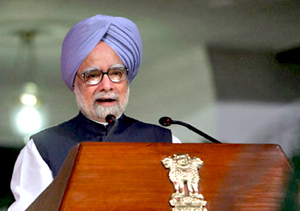 New Delhi, Nov 23: Prime Minister Manmohan Singh today warned that terrorist groups may try to disrupt the forthcoming Lok Sabha and Assembly polls and asked security forces to remain alert.
New Delhi, Nov 23: Prime Minister Manmohan Singh today warned that terrorist groups may try to disrupt the forthcoming Lok Sabha and Assembly polls and asked security forces to remain alert.
Voicing concern over a "substantial increase" in the number of communal incidents in some states, he said they must be tackled with utmost firmness, without prejudice, fear or favour.
"There is a likelihood of attempts (by terror groups) to disrupt the forthcoming Lok Sabha and Assembly elections. The security forces need to be careful," the Prime Minister said while addressing a conference of country's top police brass here.
Referring to the recent communal clashes in Muzaffarnagar and adjoining districts in Uttar Pradesh which claimed many lives and displaced thousands, Singh said law and order agencies must ensure that trivial or local issues are not exploited by vested interests to inflame communal passions.
"During the current year some states have witnessed a substantial increase in the number of communal incidents. We cannot afford such a state of affairs.... Once disturbances occur they must be tackled with utmost firmness, without prejudice, fear or favour," he told the conference of Directors General Police and Inspectors General of Police.
The Prime Minister said state DGPs have the responsibility to ensure that their police force acts in the required manner in preventing communal actions.
Expressing concern over misuse of social media for fanning tension in the society, Singh said the country has witnessed misuse of social media and SMSes during the recent disturbances in Muzaffarnagar and also last year.
"There is a need to find creative solutions which do not curb the freedom of expression and the ease of communication that social media provides," he said.





Comments
Add new comment